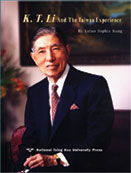|
Preface
¡@When future historians review the
history of Asia during the second half of the twentieth century,
the rapid economic growth in Taiwan definitely will be considered
an important historical event. However, in the current English
literature on Taiwan, there has been very little documentation
of the individuals that orchestrated such a phenomenal economic
growth. Consequently, although there is abundant information
on the economic policies that promoted the economic growth,
we know little about the ideas, concerns, and struggles of
the actors behind these policies. This is undoubtedly an unfortunate
gap.
¡@Among the chief economic policy-makers in Taiwan in the second
half of the twentieth century, K. T. Li probably has the most
authoritative personal review of the historic events. K. T.
Li joined the Nationalists' state enterprises in China and
Taiwan in the 1940s. Starting in 1953, he served the government
in various positions, as a member of the Industrial Development
Commission, Vice-Chairman of the Council for the US Aid, Vice-Chairman
of the Council for International Cooperation and Development,
Minister of Economic Affairs, Minister of Finance and Minister
without Portfolio. Until he retired in 1988, Li was in the
inner circle of economic policy-making in Taiwan for 35 years.
¡@In January 1992, I had an opportunity to interview K. T.
Li, then the Senior Advisor to the President of Taiwan, for
an oral history project. Originally, I planned to write solely
based on the interviews, but I soon realized that K. T. Li
had collected massive amount of data about his life and career
and that many individuals and institutions also possess precious
materials about K. T. Li and Taiwan's economic development.
Following some discussions, we soon reached the agreement
that, instead of writing an oral history, I would write a
history of Taiwan's economic development from K. T. Li's personal
point of view. The purpose was not only to understand K. T.
Li's personal experience and career, but also the process
of economic policy-making in Taiwan from 1953 to 1988. Thanks
to K. T. Li's generosity and patience, I was able to pursue
successfully this alternative plan. The project, that took
20 months to finish, involved extensive interviews with K.
T. Li himself from January 1992 to September 1993, as well
as research at 6 institutions and interviews of 9 individuals
in Taiwan. K. T. Li read the Chinese manuscript and supervised
its publication in Taipei in 1993.
¡@The English translation had K. T. Li's endorsement, but it
was not finished in time for his review before his death in
May 2001. In addition to translating, I updated materials
when it is necessary. I added a new introduction chapter in
which I discussed American advisors, K. Y. Yin (K. T. Li's
predecessor) and K. T. Li's arguments and policies for economic
growth and their impacts on Taiwan's development. I also compared
Taiwan's economic reform with that in China and Russia. It
should be noted that, since K. T. Li did not have a chance
to read the chapter, this introduction reflects primarily
my views.
¡@It is important to put Taiwan's economic growth in perspective.
Taiwan's economy is in transition. In the year of 2001, the
economy registered the first negative growth rate and the
highest unemployment rate since 1952. While many attributed
the cause of the downturn to the worldwide recession, it is
also clear that, unlike the past decades when Li was active,
Taiwan is no longer able to weather through the storms of
world recessions with continuous economic growth. Taiwan in
the year of 2001, of course, is different from Taiwan in 1952.
However, if anything is to be learned from the story of economic
growth as told by K. T. Li, it is definitely a lesson about
openness to world trade, favorable social environment, and
a persistent campaign that constantly upgraded Taiwan's dynamic
comparative advantage in the world market.
¡@First, Taiwan's economic growth depended upon open trade.
If Taiwan had the wisdom to survive the international isolation
and establish broad cultural and economic ties with more than
100 countries without their diplomatic recognition, perhaps
similar wisdom and creativity can be used to take advantage
of China's market without being threatened politically. Second,
the economic growth of Taiwan was a social movement. From
the savings movement in the 1960s, to the rise of numerous
small and medium enterprises since the 1970s, to technology
upgrade in the 1980s, the wealth of the nation was the priority
of the regime and had its unwavering attention. This priority
must be preserved even with the increasing emphasis on consumption,
environmental protection and social welfare. Third, as China
develops its economy at a rapid pace, it is clear that, Taiwan
must campaign to make itself competitive again. Taiwan not
only needs to succeed where K. T. Li had succeeded, as in
the area of electronics, it also needs to succeed where K.
T. Li had not been able to succeed, such as in the area of
biotechnology.
¡@Wherever information other than interviews with K. T. Li
was used, the source of the information is identified in the
notes. Unless otherwise noted, the material came from K. T.
Li himself.
|
